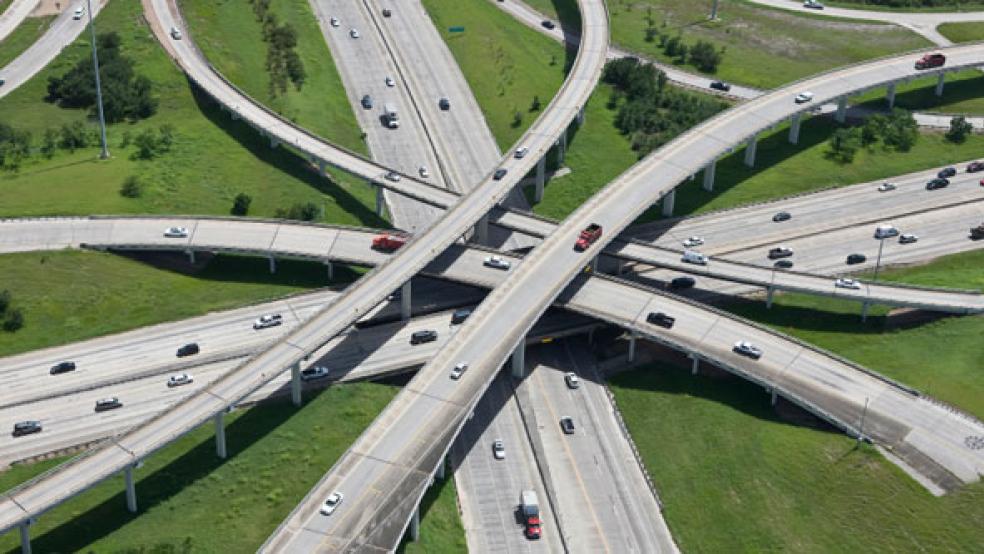The nation’s highway and infrastructure projects limped along this summer, funded by yet another short-term, patchwork spending bill approved by Congress before the August recess.
The three-month highway spending bill allowed the states to continue projects through the remainder of the summer construction season while lawmakers and the White House consider proposals for at least three more years of funding.
Related: Can Congress Keep the Economy from Driving into a Pothole?
As Republican and Democratic lawmakers return to work next week facing urgent demands from state officials and highway advocates for a more dependable and long term funding scheme, the Obama administration has begun highlighting the huge economic risks for the nation if government policy falls short of the needs of the transportation system and other infrastructure projects.
Roughly 14 million people – or one out of every ten American workers—are currently involved in designing, building, operating and overseeing the nation’s transportation, waterways, and energy systems, according to the Brookings Institution.
A new report by the Departments of Transportation, Labor and Education found that transportation related activities alone will add 417,000 net new jobs through 2022, provided federal and state governments make adequate investments.
The Department of Transportation funds and oversees more than $51 billion of surface transportation construction annually, including highways, bridges and other public transportation systems. For every $1 billion expended on this sort of infrastructure, 13,000 jobs will be created over the coming decade, according to the government report.
Related: Why Winter Ravaged Roads and Bridges Need a Gas Tax Makeover
“In addition to these hundreds of thousands of jobs that will be created, transportation employers across the main subsectors of trucking, transit, air, highway, rail, and maritime will need to hire up to 4.6 million workers – 1.2 times the current transportation workforce – in the next decade, due to the industry’s employment needs that will result from growth, retirements, and turnover,” the report added. “Many of these individuals will require training to meet the skill requirements of transportation employers.”
As state governments compete with one another to attract more businesses and residents, investment in infrastructure is a vital tool in their arsenals. “Careers in the transportation industry can lift Americans into the middle class or help them stay there, and this report concludes that there will be more job opportunities in the near future,” said Secretary of Transportation Anthony Foxx.
Under current policies, there will be net transportation job growth in practically every state and region. The cities most likely to benefit from this job expansion include Los Angeles, Dallas, Houston, Chicago and New York, according to the report. Only two states -- Kentucky and Vermont – are likely to incur small declines because of spending or policy decisions.
Related: Obama Says China’s Infrastructure Puts the U.S. to Shame
Joseph Kane, a senior analyst with Brookings who specializes in metropolitan infrastructure, stressed the importance of these jobs because they pay more competitive wages in contrast to all jobs nationally and they provide as much as 30 percent more in salary to lower-income workers. He says that these transportation-related jobs fill “a huge void” in an important segment of the workforce.
In an interview on Thursday, Kane said that lawmakers, state officials, business groups and other advocates have understandably focused on the problems of a near bankrupt Federal Highway Trust Fund that has repeatedly threatened the cutoff of critical federal funds for highway and bridge projects.
Kane said that some may be overlooking or mistakenly downplaying the importance of funding infrastructure projects across the board that are vital to the country’s long term economic well-being. President Obama has repeatedly warned that the U.S. lags far behind China and other global economic rivals in infrastructure construction, such as energy grids, port facilities, airports and other major projects that enhance a country’s competitive edge in trade.
“There’s been this predominant focus” on highway and bridge projects, he said, particularly in a post-recessionary era when the government engaged in considerable stimulus spending to try to jump-start the economy.
Related: The U.S. Still Won’t Invest In 21st Century Infrastructure
“But what this DOT report and what we at Brookings have emphasized in the past is that the highway trust fund is supporting a lot of those construction jobs, but it’s also important to create and maintain those infrastructure facilities that ultimately are operated by millions of different workers across the country.”
“So it’s not just construction workers you see along the highways, but it is also the truck drivers, the technicians, the engineers – workers across all skill levels—that are involved in these projects,” Kane said.





